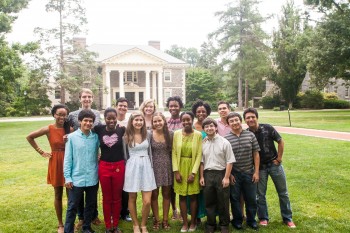Getting a Strong Start With the Chesick Scholars Program

The 2014 Chesick Scholars gathered for a group portrait during the five-week residential program they attended on campus over the summer.
Details
Luis Rivas '16 is the first person in his family to attend college; his younger brother Marco, who joined the Class of 2018 this fall, is the second. Both applied to Haverford through Questbridge, an organization that matches high-achieving, low-income students with top-tier schools. Though they are both pre-med and interested in chemistry, they are also passionate musicians. And, together, they represent the oldest and newest participants in the John P. Chesick Scholars Program: Haverford's contribution to a nationwide conversation on how to address the challenges faced by students who come from groups historically underrepresented in higher education.
Now in its third year, the Chesick Scholars Program has been in development since 2002. After seeing some students struggle in the natural sciences in spite of high ability, Senior Lecturer in Mathematics Jeff Tecosky-Feldman suggested that Haverford implement a summer program to ease the transition to college. With funding from the Mellon Foundation, Haverford hosted a conference on summer bridge programming, and Tecosky-Feldman made a number of investigative visits to schools with successful programs.
Finally, the San Francisco Foundation offered support for programming that would aid in the college success of students from under-resourced backgrounds. Drawing inspiration from the nationally recognized Meyerhoff Scholars Program at the University of Maryland, Baltimore County, a group of Haverford faculty and administrators worked together to draft a blueprint for two initiatives that would work in concert. One would become the John P. Chesick Scholars Program, named in honor of a Haverford chemistry professor known for being a strong mentor to his students. The other program would become the Office of Academic Resources (OAR), a centralized“beehive” of academic support systems available to all students. Dean Phil Bean, who was part of the group that drafted the plans for the Chesick Program and the OAR, says much credit is owed to the San Francisco Foundation.“These programs would not exist at all if the San Francisco Foundation had not expressed interest in funding something like this at Haverford,” says Bean.
The Chesick Program takes a longitudinal approach that places emphasis on trusted mentoring rather than remedial education. Each year, a committee at Haverford selects a cohort of 15 incoming students with interests across the disciplines to become scholars. Before entering as freshmen, the Chesick Scholars participate in a five-week residential program that offers credit-bearing courses and exposes them to resources at Haverford and in the Philadelphia area. At the end of the summer session, the students give presentations on their academic work at the annual Chesick Scholars Symposium. (This year, the Scholars reported on their readings and research for a“Material Religion” course taught by Religion Professor Ken Koltun-Fromm '88, and for a course titled“Reproduction or Mobility: Analyzing Social Class Theory through Ethnographic and Empirical Research,” taught by Bryn Mawr-Haverford Education Program Lecturer Heather Curl '03.)
Once the school year begins, the Scholars are matched with faculty mentors who lend support with academic and personal matters throughout their undergraduate careers. Beginning last year, previously admitted Chesick Scholars also have the opportunity to mentor students in the cohort that precedes their own. Finally, the program provides guidance and funding for the Chesick Scholars to pursue research opportunities and other projects during summer break.
The first time Luis Rivas set foot on campus was on the first day of the very first Chesick summer program in 2012. It was a daunting, isolating experience, he recalls. His parents had received an eighth grade education before moving from Ecuador to the United States. He was one of the few graduating seniors at his Chicago high school to go to a four-year, out-of-state institution, and he did not know anyone at Haverford.
The Chesick Program worked quickly to ease Rivas' transition. Not only did he get an opportunity to adjust to Haverford's academic rigor through pass/fail courses, he found a strong social network. Rivas became good friends with the scholars in his cohort and remains close with many of them today, often dropping by their rooms to hang out or talk through a problem.
Throughout his freshman and sophomore years, Rivas worked with his mentor, Associate Professor of Chemistry Fran Blase, to improve his study habits, resolve personal problems, and ultimately cultivate a sense of belonging.
“Sometimes I question why I am here or why I was accepted here,” says Luis.“After those two years of having her [Blase] as my advisor, I feel I have the confidence to say that I am a Haverford student and I'm here because I deserve to be here.”
Mentors often refer scholars to other resources for help, including other mentors. For instance, Rivas has reached out to Tecosky-Feldman for help with a number of unexpected challenges: filing his taxes, scheduling medical appointments, and, when his mother was diagnosed with cancer, securing funds from the Dean's office to visit her in Chicago. He and his brother Marco affectionately joke that Tecosky-Feldman is the“thirteenth apostle” for all the work he does. (He serves as the director of the summer program, an instructor during the summer program, and works as a mentor and member of the Chesick Program committee during the school year.)
Speaking with Tecosky-Feldman, it is apparent the admiration is mutual.“I've learned just as much from my mentees as they've learned from me,” he says. In general, he has found that mentoring is as rewarding as it is time-intensive.“Many of the faculty who have done it have said to me that they couldn't see going back to the previous scheme of freshman advising,” he says.
—Sam Fox '14



